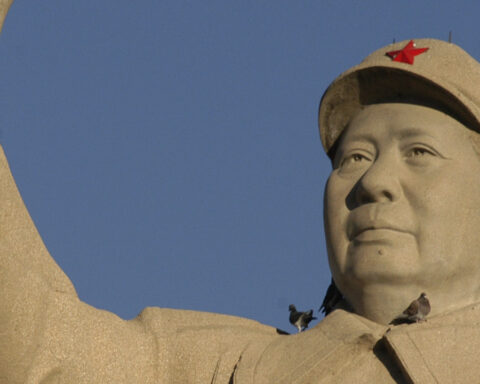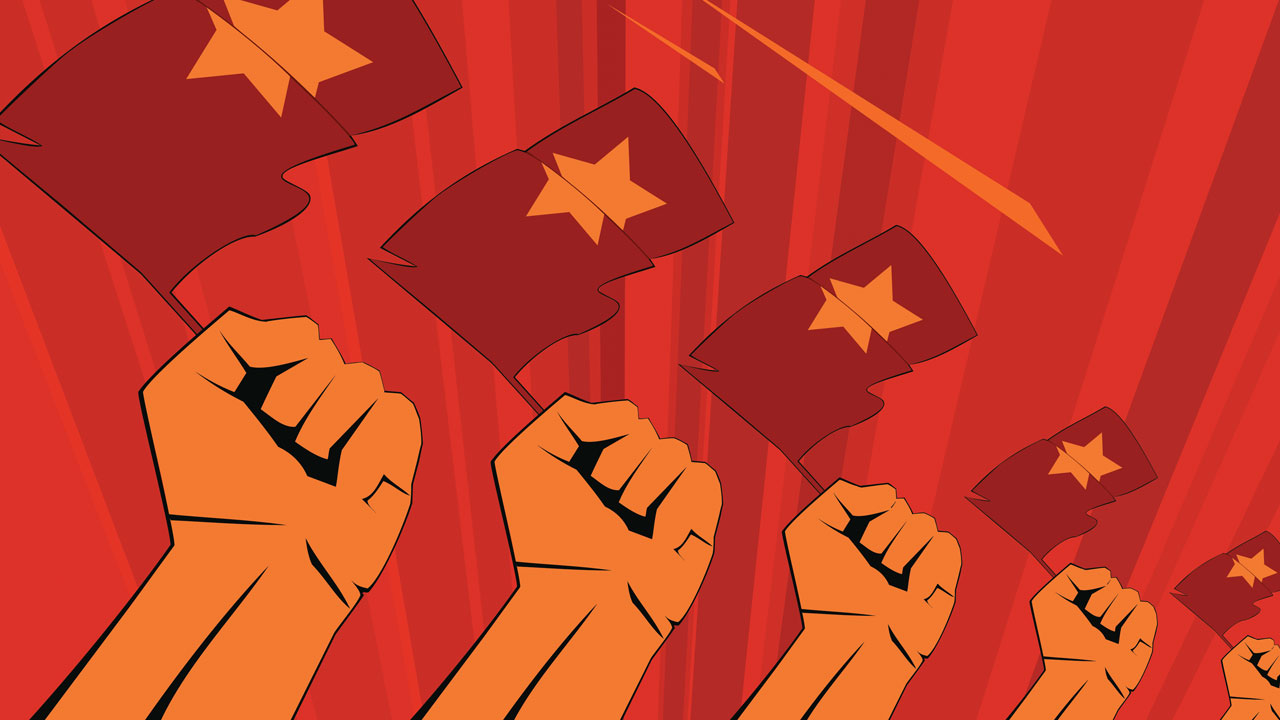The following is the second part of Justin Haskins’ “Why Marx’s Socialism Is Evil” article. The first part of the article is available by clicking here.
Gambling
According to a 2013 study of moral attitudes by the Pew Research Center, 24 percent of Americans say they believe gambling is “morally unacceptable.” While this group is clearly a minority in the United States, where gambling is widespread, there remains tens of millions of people who believe these activities are morally wrong, and in some cases, those beliefs are linked to religion.[6]
For example, the Church of Jesus Christ of Latter-Day Saints, the largest Mormon church in the world, teaches gambling is morally wrong and should be outlawed: “The Church of Jesus Christ of Latter-day Saints is opposed to gambling, including lotteries sponsored by governments. Church leaders have encouraged Church members to join with others in opposing the legalization and government sponsorship of any form of gambling.”[7]
How would gambling activities be treated in a socialist society? In socialist-communist society like the one imagined by Karl Marx, there likely would be very limited individual property ownership, making gambling unlikely to occur. But in society in which many but not all aspects of an economy are socialized, it’s conceivable a socialized gambling industry could exist. Indeed, this is precisely what the modern lottery system is: The state operates a gambling operation and uses the proceeds for various government activities.
Although lotteries are mostly or completely paid for by participants, a case can be made those morally opposed to lotteries and other forms of state-sponsored gambling are not currently forced take part in these schemes. This, however, is not completely accurate. Gambling operations don’t fall from out of the sky. They must start somewhere, potentially requiring taxpayer funds to get the ball rolling. Further, and more importantly, the funds collected by the lottery are used to pay for numerous government programs, which means most Americans are, whether they realize it or not, in some way benefiting or participating in gambling, including those who believe gambling is immoral.
Alcohol
Mormons and various other religious groups oppose the consumption of alcohol, including some Muslims, Protestant Christian groups, and Seventh-day Adventists. In Pew Research Center’s 2013 study of morality, which included respondents from 40 countries, 42 percent of survey participants said “alcohol use” is “morally unacceptable.”[8]
In a socialist society in which the economy is completely socialized, all alcohol distilleries would be collectively owned and operated. Although this wouldn’t require anyone to consume alcohol, it would mandate all people participate, either directly or indirectly, in the consumption of alcohol by others. This would violate the consciences of those who believe it’s immoral to take part in the alcohol industry and force some to violate their religious beliefs.
A Nation of Arms Dealers
In the United States, the Second Amendment in the Bill of Rights protects individuals’ right to “bear arms”: “A well regulated Militia, being necessary to the security of a free State, the right of the people to keep and bear Arms, shall not be infringed.” Although many disagree over the exact meaning of this amendment, one thing is clear: American adults have the right to own firearms. (An examination of which firearms and weaponry is beyond the scope of this article.)
The United States is home to some 270 million guns, more guns than anywhere else in the world. Despite the large population of gun owners in America, however, there remains a very large segment of the population that opposes gun ownership for individuals, mostly based on the idea guns are too dangerous for most people to own. Even the guns of responsible owners could, they argue, end up in the hands of criminals.
For this reason, and many others, numerous anti-gun advocates say they would never own firearms and don’t recommend anyone else own them, either. But in a socialist society in which individuals can own guns, every gun produced must be manufactured by collectively owned gun factories and distributed by collectively owned gun outlets.
As a supporter of the Second Amendment, it is my strong belief private gun ownership is a benefit to society, not a vice. But as an ardent supporter of individual liberty, I think it is incredibly immoral to force people who oppose gun ownership to effectively become arms dealers.
The only way to avoid this problem would be to ban all guns, but this policy is unlikely to work in America for numerous reasons, not the least of which being there are millions of gun owners here who would never peacefully give up their weapons (because they believe they have a natural right to possess them). It’s also highly unlikely, no matter how socialized the U.S. economy becomes, an amendment to the Constitution banning gun ownership would ever be ratified by the requisite three-fourths of states. Thus, if America were to adopt socialism, it could likely only do so if all gun manufacturing and distribution were collectively owned.
Cogs in the Wheel
Perhaps no area of life is more personal and important than the relationship between parents and their children. In America, parents have long enjoyed significant protections guaranteeing their right to instill the values in their kids that they believe to be most important. In a socialist system, that would become difficult, if not possible, to achieve.
In socialism, every part of society, including educational institutions, are run collectively, which means education and professional development are also determined collectively by the majority of voters. Thus, parents’ rights only exist to the extent that the majority of people allow them to. And even in societies that permit parents to teach their children whatever they want, the same diversity would be impossible in the government-run school system, where a single organization would ultimately decide what everyone learns at every stage of life. How else could a whole nation or world ensure that there are enough skilled workers in every industry to provide for the needs of the collective?
Some might not be concerned about such an arrangement, especially since many schools and colleges in the West today are funded or run by government. But it’s important to remember that in a socialist economy, where all industries are planned and controlled by the collective, there would be a strong incentive for schools to push children into those fields where the collective believes they would be most useful, rather than where their interests are. Children’s individual skills and interests would need to make way for the requirements of the rest of society. This means children in a socialist system would become more like cogs in a gigantic wheel than individuals with unique desires and dreams.
Further, who would determine how to teach children about morals, and which morals would be valued? It’s certainly possible an educational system could fairly present all of the world’s moral systems and allow the children to decide for themselves which ideas to adopt, but there’s no guarantee that would occur in a system in which the majority has the power to hire and fire all educators and no educational alternatives are permitted. It’s much more likely the majority’s views, however extreme they might be, would be imposed on the minority through the education system.
This presents some significant moral problems, especially for religious minorities. For instance, in a socialist education model, what can Christian, Jewish, Muslim, and other religious parents do if the school system decides to teach a view of sexual ethics that violates their beliefs? Socialism doesn’t allow for diversity because the collective makes decisions for everyone.
Some might suggest that a socialized education system could permit several different kinds of education systems under a larger nationalized or global system, but such a model would violate important aspects of socialist thinking. A truly socialized economy wouldn’t permit educational alternatives because such alternatives would mean some people are getting a higher-quality education, which must be outlawed to ensure economic classes do not develop. Socialism can only survive when there are virtually no options. If any options exist, there will inevitable be varying degrees of quality and thus some people will end up with better outcomes than others.
Nowhere to Run: Global Socialism
In my article “What Is Socialism,” I explained some Marxist socialists have reasoned—and correctly so—that regional or even national socialist models cannot work effectively in the long run. They insist that for Marx’s socialism to be fully realized, socialism must be adopted on a global scale.
In The Communist Manifesto, Marx attempts to refute several criticisms of his socialist ideas, including that it was dangerous that he and others desired “to abolish countries and nationality.”[9]
In response, Marx wrote, “The working men have no country. We cannot take from them what they have not got. Since the proletariat must first of all acquire political supremacy, must rise to be the leading class of the nation, must constitute itself the nation, it is, so far, itself national, though not in the bourgeois sense of the word.” Marx later added:
United action, of the leading civilised countries at least, is one of the first conditions for the emancipation of the proletariat. In proportion as the exploitation of one individual by another is put an end to, the exploitation of one nation by another will also be put an end to. In proportion as the antagonism between classes within the nation vanishes, the hostility of one nation to another will come to an end.[10]
Marx clearly had a global understanding of socialism in mind, although his writing here doesn’t explicitly deny the possibility that there could be separate nations—albeit in a different sense than what is found today. He does suggest, however, that once socialism takes hold worldwide, the “hostility of one nation to another will come to an end,” because the exploitation of one nation over another would also end. This only makes sense, if we apply basic logic to Marx’s thinking, if socialism is applied worldwide. I say this because Marx repeatedly alleges that the collective control and ownership of property is essential for ending class division, which Marx believed to be one of the root causes of exploitation. If there is no exploitation of one country over another, as Marx suggests, it must be because there are no classes. And if there are no classes, it must be because there is common property ownership, which would mean national borders would be nonexistent or meaningless.
Friedrich Engels, who worked very closely with Marx, wrote in his Origin of the Family, Private Property, and the State that the end of all nation states is unavoidable:
The state, therefore, has not existed from all eternity. There have been societies which have managed without it, which had no notion of the state or state power. At a definite stage of economic development, which necessarily involved the cleavage of society into classes, the state became a necessity because of this cleavage. We are now rapidly approaching a stage in the development of production at which the existence of these classes has not only ceased to be a necessity, but becomes a positive hindrance to production. They will fall as inevitably as they once arose. The state inevitably falls with them. The society which organizes production anew on the basis of free and equal association of the producers will put the whole state machinery where it will then belong–into the museum of antiquities, next to the spinning wheel and the bronze ax.
The reason the global nature of socialism is relevant to our discussion about whether socialism is evil is because all the concerns mentioned previously about socialism are made significantly worse when applied on a global scale. If people have nowhere on Earth they can go to escape the will of the majority, then the world’s minorities must always live in accordance with the demands and standards of the global majority.
For Americans and Europeans, this should be a particularly troubling thought since they are far outnumbered by the rest of the world. In fact, there are likely more people living in Asia than in all other parts of the world combined, which means in a global socialist system, Asia would alone have the power to decide how the world’s resources are used.
It must be noted here that this concern is not meant to be an affront on Asian nations or their people. It simply illustrates that in global socialism, economic decision-making would be concentrated in one part of the world, putting at risk the rights of every other part of the world. And while some might say this problem already exists, because nations like the United States have a tremendous amount of power relative to other countries, a global socialist model would create entirely new and much more severe problems, because under a socialist scheme, the majority would, through democratic means, control every piece of collectively owned property.
Marx’s Unavoidable and Evil Revolution
In many modern Marxist socialist books and articles, socialists attempt to distance themselves from the failures of numerous self-described “socialist” and “communist” parties, both past and present. This is understandable given the intense criticism socialists often receive by those alleging socialism has already failed horrendously in Cambodia, China, North Korea, the Soviet Union, Venezuela, and elsewhere.
As I’ve already noted, it’s unfair to claim Marx’s end goal was a nation dominated by a centralized, oppressive government. Marx’s communism specifically prohibited such a ruling class, and modern socialists in the West have made it abundantly clear they support democratic decision-making, not authoritarianism.
However, while Marx’s end goal was the decentralization of political and economic power, he did at times acknowledge the need for a working-class revolution during which the working class would temporarily use “force” to seize control of nations and existing authoritative structures. In The Communist Manifesto, Marx wrote:
When, in the course of development, class distinctions have disappeared, and all production has been concentrated in the hands of a vast association of the whole nation, the public power will lose its political character. Political power, properly so called, is merely the organised power of one class for oppressing another. If the proletariat [working class] during its contest with the bourgeoisie [those who control most property] is compelled, by the force of circumstances, to organise itself as a class, if, by means of a revolution, it makes itself the ruling class, and, as such, sweeps away by force the old conditions of production, then it will, along with these conditions, have swept away the conditions for the existence of class antagonisms and of classes generally, and will thereby have abolished its own supremacy as a class.[11]
As Marx makes clear, it may be necessary “by means of a revolution” for the working class to make itself “the ruling class” and “[sweep] away by force the old conditions of production” because doing so will sweep away “the conditions for the existence of class antagonisms and classes generally …”
Many socialist groups and parties are opposed to violent and tyrannical revolutions, but it’s not hard to imagine why some who would like to build a utopian socialist society believe the only way to accomplish such a feat would be to forcefully seize political power.
Unless those who control capital, including land, willingly give up their property, some kind of tyrannical governmental or revolutionary action is necessary to transition to a world where all or nearly all property is owned collectively. The moral problems associated with such a destruction of private property rights are many and horrifying, but because many modern socialist parties and thinkers deflect such concerns by suggesting most people will choose to willingly give up their property to help usher in the new socialist world, there’s no need to address actions that even many socialists acknowledge would be highly immoral. It is worth mentioning here, though, that common sense suggests most people would not give up their property absent some degree of violence; force and coercion are likely necessary to bring socialism into existence.
Conclusion
Marx’s vision for a pure socialist-communist world has not yet come to fruition, and it arguably never will because of the many moral and practical problems outlined in previous sections. However, these concerns haven’t stopped revolutionaries around the world from attempting to bring about a socialist-communist paradise, and in so doing, killing tens of millions of people and pushing hundreds of millions more into despair.
As I hope I have proven, even if a Marxist-socialist system could be properly, effectively, and peacefully implemented—something I believe to be an impossibility—the resulting system would sacrifice the rights of the individual and minority groups so that the “collective” could have greater power and control.
PHOTO: Old Havana, Cuba. iStock photo by terex.
[6] “Global Views on Morality,” Pew Research Center, 2014, accessed June 7, 2018, http://www.pewglobal.org/2014/04/15/global-morality.
[7] “Gambling,” lds.org, Church of Jesus Christ of Latter-Day Saints, accessed June 7, 2018, https://www.lds.org/topics/gambling?lang=eng.
[8] Pew Research Center, supra note 27.
[9] Karl Marx, supra note 1, p. 18.
[10] Ibid., pp. 18–19.
[11] Karl Marx, supra note 1, p. 21.
Justin Haskins is editor-in-chief of 1818 Magazine. Haskins is a widely published writer and political commentator, the director and founder of The Henry Dearborn Institute for Human Rights, and the editorial director and research fellow at The Heartland Institute, a national free-market think tank. Haskins was first contributor to Glenn Beck's "Arguing with Socialists," a New York Times best-selling book, and the author of "Socialism Is Evil," an Amazon bestseller. He writes columns for FoxNews.com, Newsweek, and The Hill, has appeared on television more than 100 times, including numerous appearances on "Tucker Carlson Tonight." His work has been featured by the New York Times, Washington Post, Wall Street Journal, National Review, New York Post, and the White House, among many other sources. Haskins was named one of the "Top 30 Republicans Under 30" by Newsmax, is a member of the Philadelphia Society, and holds two master's degrees from Regent University. Follow him on Twitter @JustinTHaskins.







